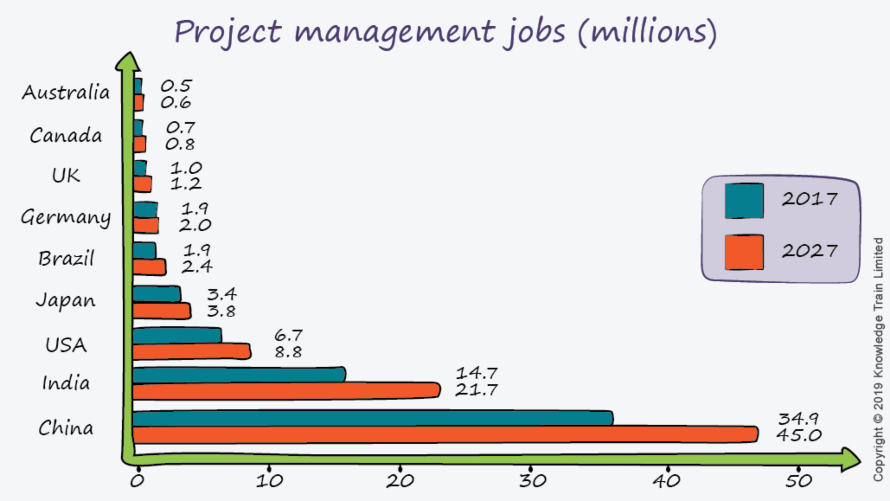
Introduction
This article explores the available knowledge-based project management certifications so you can choose the best one for you.

Types of project management qualifications
There are 2 types of project management qualifications: knowledge-based and competency-based.
Knowledge-based qualifications
Knowledge-based qualifications require a candidate to show their knowledge of project management – mainly by passing an examination.
Knowledge-based qualifications are suited for people seeking entry to the project manager profession because they usually do not require any prior project management experience.
Competency-based qualifications
Competency-based qualifications require a candidate to show their abilities across a range of project manager competencies. This is done by observing a candidate working alone, working in a group and by interview.
They often require prior project management experience. They are suited to people who want to benchmark their skills against other project managers in the profession.
The rest of this article will only consider knowledge-based project management certification.
Project management qualification levels
A project management qualification can be one of 2 broad types:
Entry-level qualifications
- These teach students about project management concepts and terminology.
Higher-level qualifications
- These teach students to apply project management concepts and methods.
Accreditation bodies
This table shows the 4 main accreditation bodies and their project management qualifications.
| Accreditation body | Entry level qualification | Intermediate level qualification |
|---|---|---|
| PeopleCert | PRINCE2 Foundation PRINCE2 Agile Foundation |
PRINCE2 Practitioner PRINCE2 Agile Practitioner |
| Association for Project Management (APM) | Project Fundamentals Qualification (PFQ) | Project Management Qualification (PMQ) |
| APM Group (APMG) and Agile Business Consortium | AgilePM Foundation | AgilePM Practitioner |
| Project Management Institute® (PMI®) | Certified Associate Project Management (CAPM)® | Project Management Professional (PMP)® |
UK project management qualifications
In the UK, the main project management qualification bodies are:
- PeopleCert
- Association for Project Management (APM)
- APMG International and Agile Business Consortium.
PeopleCert qualifications
PRINCE2 is the main project management qualification from PeopleCert. It has both introductory and intermediate qualifications. Over 2 million PRINCE2 exams have been taken since 1996.
PRINCE2 certification is popular in the UK, Europe and Australia. It’s especially desirable in the UK public sector.
A big attraction of PRINCE2 is that qualifications can be obtained without needing prior project management experience. This is especially useful for people wanting to start a project management career.
PRINCE2 Foundation qualification
- Difficulty level: low.
- Prerequisites: none.
- For: people wanting a basic introduction to project management best practices.
- Covers: basic understanding of the PRINCE2 methodology.
- Reference book: Managing Successful Projects Using PRINCE2 (7th edition).
- Study duration: 2-day classroom or 20 hours online.
- Exam: 1 hour, 60 multiple-choice questions.
- Learning path: PRINCE2 Foundation course.
PRINCE2 Practitioner qualification
- Difficulty level: medium.
- Prerequisites: any of the following qualifications:
- PRINCE2 Foundation or PRINCE2 Practitioner (6th edition)
- APM Project Management Qualification (PMQ)
- APM Project Professional Qualification (PPQ)
- PMI® Certified Associate in Project Management
- PMI® Project Management Professional (PMP)®
- IPMA® Levels A, B, C or D.
- For: people wanting to learn how to apply best practices on projects.
- Covers: application of the PRINCE2 methodology.
- Reference book: Managing Successful Projects Using PRINCE2 (7th edition).
- Study duration: 2-day classroom or 15 hours online.
- Exam: 2.5 hours, 70 objective questions.
- Learning path: PRINCE2 Practitioner.
IPMA® is a registered trademark of IPMA in Switzerland and other countries.
PRINCE2 Agile Foundation qualification
- Difficulty level: low.
- Prerequisites: none.
- For: people wanting to learn how about project management best practices on Agile projects.
- Covers: understanding of the PRINCE2 methodology in Agile environments.
- Reference book: PRINCE2 Agile (360 pages).
- Study duration: 2-day classroom, or 12 hours online.
- Exam: 1 hour, 50 multiple-choice questions.
- Learning path: PRINCE2 Agile Foundation.
PRINCE2 Agile Practitioner qualification
- Difficulty level: medium.
- Prerequisites: any of the following qualifications:
- PRINCE2 Foundation
- PRINCE2 Agile Foundation
- PMI® Certified Associate in Project Management
- PMI® Project Management Professional (PMP)®
- IPMA® Levels A, B, C or D.
- For: people wanting to learn how to apply best practices on Agile projects.
- Covers: application of the PRINCE2 methodology in Agile environments.
- Reference book: PRINCE2 Agile (360 pages).
- Study duration: 2-day classroom, or 21 hours online.
- Exam: 2.5 hours, 50 multiple-choice questions.
- Learning path: PRINCE2 Agile Practitioner.
Association for Project Management (APM) qualifications
The UK-based Association for Project Management (APM) is an educational charity. It is the largest independent professional body of its kind in Europe. The APM has over 13,500 individual and 300 corporate members throughout the UK and abroad.
In 2017, APM was awarded a Royal Charter as part of its strategy to raise awareness and standards in the profession.
The APM qualifications are available at introductory to advanced levels. Only the introductory and intermediate qualifications are described below.
Project Fundamentals Qualification (PFQ) (introductory level)
The APM worked with the UK Government’s Department for Education and Skills to develop the APM PFQ qualification. The PFQ qualification used to be known as the APM Introductory Certificate.
- Difficulty level: low.
- Prerequisites: none.
- For: people looking to start a career in project management or those wanting to understand the principles of project management.
- Covers: project management life cycle and related knowledge areas from the APMBoK.
- Reference book: APM Body of Knowledge 6th Edition (the APMBoK) (258 pages).
- Study duration: 2-day classroom or 25 hours online.
- Exam: 1 hour, 60 multiple-choice questions.
- Learning path: APM PFQ.
Project Management Qualification (PMQ) (intermediate level)
The APM PMQ qualification used to be known as APMP.
- Difficulty level: medium.
- Prerequisites: none although typically, candidates already have some existing project management experience.
- For: people wanting to achieve greater efficiency and effectiveness in project management.
- Covers: project management life cycle and related knowledge areas from the APMBoK.
- Reference book: APM Body of Knowledge 6th Edition (the APMBoK) (258 pages).
- Study duration: 5-day classroom or 35 hours online.
- Exam: 3 hours with 10 written questions, or 2 hours and 6 questions (for PRINCE2 Practitioners only).
- Learning path: APM PMQ.
APMG International qualifications
APMG offers the AgilePM® Agile Project Management qualifications in conjunction with the Agile Business Consortium. These are based upon the Agile Project Framework – the latest version of DSDM, one of the oldest Agile methods. There are both introductory and intermediate qualifications.
AgilePM qualifications have grown rapidly since its launch in 2011. More than 200,000 exams have been taken.
AgilePM qualifications are popular within the IT and software industries.
AgilePM Foundation (introductory qualification)
- Difficulty level: low.
- Prerequisites: none.
- For: people wanting to learn about managing agile projects.
- Covers: basic understanding of the Agile Project Framework.
- Reference book: Agile Project Management Handbook (240 pages).
- Study duration: 3-day classroom or 20 hours online.
- Exam: 40 minutes, 50 multiple-choice questions.
- Learning path: AgilePM Foundation.
AgilePM Practitioner (intermediate qualification)
- Difficulty level: medium.
- Prerequisites: AgilePM Foundation.
- For: people wanting to learn how to manage agile projects.
- Covers: application of the Agile Project Framework.
- Reference book: Agile Project Management Handbook (240 pages).
- Study duration: 1-day classroom or 15 hours online.
- Exam: 2.5 hours, 80 multiple-choice questions.
- Learning path: AgilePM Practitioner.
Non-UK qualifications
Outside the UK, the main project management qualification bodies are:
- Project Management Institute (PMI)®
- IPMA®.
Project Management Institute (PMI)® qualifications
The most popular project management qualifications in the USA, Canada, Asia and Africa are those offered by the Project Management Institute (PMI)®. PMI® certifications requires prior experience, so they are harder to obtain than the other qualifications listed above.
Certified Associate in Project Management (CAPM)® (introductory qualification)
- Difficulty level: low (for the exam).
- Prerequisites:
- A secondary degree (high school diploma or global equivalent); and
- At least 1,500 hours of experience on a project team, or 23 hours of project management education prior to sitting the exam.
- For: people wanting a globally recognized project management qualification.
- Covers: project management processes and terminology.
- Reference book: A Guide to the Project Management Body of Knowledge (PMBOK® Guide), 7th Edition.
- Study duration: 35 hours online.
- Exam: 3 hours, 150 multiple-choice questions.
- Learning path: CAPM®
Project Management Professional (PMP)® (intermediate qualification)
- Difficulty level: medium to high.
- Prerequisites:
- A secondary degree (high school diploma, associate degree, or the global equivalent) with a minimum of five years of project management experience, with 7,500 hours leading and directing projects and 35 hours of project management education; or,
- A four-year degree (bachelor’s degree or the global equivalent) and at least three years of project management experience, with a minimum of 4,500 hours leading and directing projects and 35 hours of project management education.
- For: people wanting a globally recognized project management qualification.
- Covers: the application of project management knowledge, skills, tools, and techniques.
- Reference book: A Guide to the Project Management Body of Knowledge (PMBOK® Guide), 7th Edition.
- Study duration: 35 hours online.
- Exam: 4 hours, 200 multiple-choice questions.
- Learning path: PMP®
International Project Management Association (IPMA®) qualifications
The IPMA® is a Federation of over 55 Member Associations (MAs), each representing one country. The MAs develop project management competencies in their geographic areas.
The IPMA has a four-level certification program:
- IPMA Level A: for those managing complex project portfolios and programmes.
- IPMA Level B: for those managing complex projects. Minimum five years of experience.
- IPMA Level C: for those managing moderately complex projects. Minimum three years of experience.
- IPMA Level D: for those working on projects seeking project management knowledge.
Since 2004, the IPMA has certified more than 150,000 project managers in over 50 countries. One of the largest Member Associations is the UK-based Association for Project Management (APM).
Certification popularity
As a company offering project management training since 2005 we’ve learned a lot about the popularity of the many different project management qualifications and exams.
It’s difficult to find information about the number of exams taken. We have made some educated guesses about them. We based these upon information in the public domain.
| Accreditation body | Total number of exams | Annual number of exams |
|---|---|---|
| AXELOS | 2 million+ | 100,000+ |
| Association for Project Management (APM) | Less than 100,000 | Less than 10,000 |
| The APM Group (APMG) | 200,000+ (since 2011) | 25,000+ |
| Project Management Institute® (PMI®) | 1 million+ | 100,000+ |
Choosing a qualification
Employers like to choose candidates for project manager roles based upon their experience. Without experience it’s unlikely you’ll find a job in project management.
However, evidence of a professional qualification can help you. Choose one of these scenarios to help you decide the best qualification.
I want to start a new career in project management
- If you want to take part in projects, choose a lower-level certificate (e.g. PRINCE2 Foundation, APM PFQ)
- If you want to manage projects, choose a higher-level certificate (e.g. PRINCE2 Practitioner, APM PMQ).
I have experience and want to boost my CV/resume
- If you’re based in the UK, Australia or Europe, choose PRINCE2.
- If you’re working either in the US (or Canada, Africa, or Asia) or you work for a US-based company, choose PMI®.
I work on Agile projects
- Choose AgilePM if you don’t already have PRINCE2; or,
- Choose PRINCE2 Agile Practitioner if you already have PRINCE2.
I already hold one qualification and want another
See the table of qualifications below. If you hold a qualification on the left, the recommended qualification is shown on the right.
| Current qualification | Recommended qualification |
|---|---|
| PRINCE2 Foundation | PRINCE2 Practitioner or PRINCE2 Agile Practitioner |
| PRINCE2 Practitioner | APM PMQ |
| PRINCE2 Agile Foundation | PRINCE2 Agile Practitioner |
| PRINCE2 Agile Practitioner | AgilePM Foundation/Practitioner |
| AgilePM Foundation | AgilePM Practitioner |
| AgilePM Practitioner | APM PMQ or PRINCE2 Foundation/Practitioner |
| APM PFQ | APM PMQ |
| APM PMQ | PRINCE2 Foundation/Practitioner |
| PMI CAPM® | PMI PMP® |
| PMI PMP® | PRINCE2 Foundation/Practitioner |
Summary
There’s a lot of different project management qualifications to choose from. It can be a tricky choice choosing the right one for you. If you follow this guide, you’ll have a better chance of choosing the right qualification to meet your needs.








